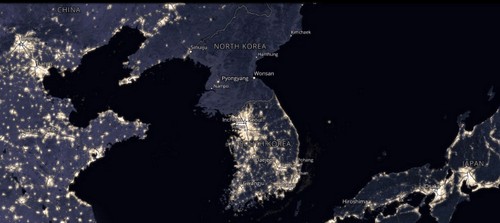North Korea often appears as an enigma to the outside world, a nation shrouded in secrecy and defined by its severe restrictions and unwavering adherence to a unique political ideology. Understanding why North Korea is so strict requires delving into the core tenets of its ruling regime and the historical and political context that has shaped its iron grip on power. It’s not merely a matter of isolated policies; the strictness is deeply ingrained in the very fabric of North Korean society, serving as a critical tool for maintaining absolute political control.
 Satellite view of North Korea at night emphasizing darkness and isolation compared to neighboring countries, illustrating the nation's strict control and lack of development.
Satellite view of North Korea at night emphasizing darkness and isolation compared to neighboring countries, illustrating the nation's strict control and lack of development.
The strictness observed in North Korea is not an arbitrary imposition but rather a calculated strategy by the ruling elite to perpetuate their dominance. This isn’t due to a lack of potential for growth; much like South Korea’s remarkable transformation, North Korea possesses inherent capabilities for economic development. However, the Kim dynasty, from its inception, has prioritized political survival above all else. This prioritization manifests in an all-encompassing system of micromanagement that permeates every aspect of life, from the economy to personal freedoms. Alternative viewpoints are not just discouraged; they are ruthlessly suppressed, ensuring no challenge to the established authority can take root. This suffocating environment stifles individual potential and cripples the nation’s economy, leading to stark contrasts with its more prosperous neighbors. Consider the economic disparity: North Korea’s estimated GDP hovers around $1,700, while South Korea’s soars to $39,500. Similarly, export figures paint a telling picture, with North Korea at $1.74 billion compared to South Korea’s massive $596 billion.
One of the most devastating consequences of this strict political control is widespread food insecurity. As Joseph Kim, who escaped North Korea in 2006, poignantly stated, “When I lived in North Korea, all I worried about was getting food.” Decades of economic mismanagement, inherent to a centrally controlled system, culminated in the collapse of the state-socialist economy in the 1990s. The Public Distribution System, once the lifeline for food for ordinary North Koreans, crumbled. In a grim illustration of the regime’s priorities, food supplies were systematically diverted to elites and politically favored regions, leaving less loyal populations to starve. The famine that ensued in the mid-to-late 1990s was a catastrophe, claiming up to a million lives out of a population of approximately 20 million, marking it as one of the 20th century’s most horrific famines.
Shimon Huh, who escaped in 2013, recounted the horrifying reality: “Back then, if you walked around outside, you’d see dead bodies everywhere, like some kind of battlefield. They were people who’d starved to death.” While food security has marginally improved since the famine’s peak, chronic shortages remain a stark reality for many. The regime’s continued refusal to embrace economic liberalization, coupled with the country’s vulnerability to natural disasters and limitations on essential agricultural inputs, perpetuates this precarious situation. The most vulnerable, millions of malnourished children, babies, pregnant women, and nursing mothers, bear the brunt of these ongoing shortages, leading to a generation plagued by stunted growth and heightened susceptibility to health issues.
The public health system in North Korea mirrors this pattern of systemic failure masked by state propaganda. Despite official claims of universal healthcare, the reality on the ground is drastically different. The public healthcare system largely collapsed in the 1990s, with functional facilities concentrated in Pyongyang and other elite areas. Outside these privileged zones, healthcare access is often contingent on affordability, leaving ordinary citizens vulnerable to preventable and treatable poverty-related diseases like tuberculosis and cataracts. Jessie Kim, who escaped in 2011, shared a heartbreaking personal story: “My mom had a liver disease. The kind of disease that I would learn after leaving North Korea was curable if she had been treated. But in North Korea, the regime controls the healthcare system and we didn’t have the money or the right political connections to get her the care she desperately needed. Near the end, I held her hand and begged her to get better. I promised her that if she stayed alive long enough, I would become a doctor and find a cure for her. She died in March 2003, right before my 12th birthday.”
Driven by desperation, hundreds of thousands of North Koreans have risked everything to cross into China since the famine, seeking basic necessities like food, medicine, and economic opportunities. Even today, thousands continue to flee annually, adding to the already substantial North Korean refugee population in China and the over 33,000 who have successfully reached South Korea. However, the regime’s strictness extends to its borders; leaving North Korea without explicit permission is illegal. Those caught attempting to escape, or apprehended in China and forcibly repatriated, face brutal consequences: beatings, forced labor, torture, forced abortions, and imprisonment in political prison camps. Those suspected of contact with South Koreans or Christians in China are subjected to the most severe punishments.
These defectors are, by international standards, refugees sur place due to their well-founded fear of persecution upon return. Yet, China prioritizes its political alliance with Pyongyang over international law, labeling North Korean refugees as “economic migrants” to justify their forced repatriation. Under Kim Jong-un’s leadership, border security has been further tightened in collaboration with Chinese authorities. Defectors report increased physical barriers, heightened risks associated with bribing border guards, and harsher penalties for escape attempts. Consequently, the number of successful defections to South Korea continues to decline, reflecting the ever-tightening grip of the regime.
The vulnerability of North Korean refugees in China exposes another layer of the regime’s strictness – its impact beyond its own borders. Living in constant fear of repatriation, lacking legal status and protection in China, North Korean refugees are highly susceptible to exploitation. They are forced into underground industries, becoming victims of labor exploitation and sex trafficking. A staggering estimate suggests that 60% of North Korean women refugees in China are trafficked into the sex trade. Driven by a shortage of marriageable women in rural China, particularly in the Northeast, North Korean women are tragically commodified, forced into brothels, online sex platforms, or sold as wives for as little as a few hundred dollars. Joy Kim, rescued by LiNK, recounted her horrifying experience: “For three days, the broker paraded me around villages in northern China and crowds of men gathered to bid on me. The broker finally found a man who was willing to pay enough for me. I was sold for $3,000.” For many, even this horrific exploitation is perceived as a better alternative to the horrors awaiting them in North Korea.
The tragic consequences extend to the next generation. Children born to North Korean refugee mothers and Chinese fathers often face statelessness due to their mothers’ illegal status. Denied household registration in both China and North Korea, these children are deprived of basic rights, including education, healthcare, and other essential state services. An estimated 10,000 children live in this legal limbo, a silent testament to the far-reaching impact of North Korea’s strict regime.
In conclusion, North Korea’s strictness is not an anomaly but a deliberate and deeply entrenched strategy employed by the ruling Kim dynasty to maintain absolute political control. This iron-fisted rule, prioritizing regime survival above the well-being of its people, has resulted in widespread poverty, food insecurity, a collapsed public health system, and a continuous refugee crisis marked by exploitation and human suffering. The seemingly impenetrable wall of strictness is, tragically, the very mechanism that perpetuates the suffering of the North Korean people.
Learn how you can help North Korean refugees safely reach freedom
